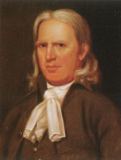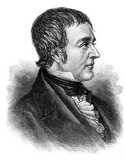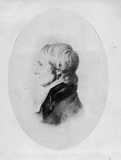Losantiville
|
Mathias Denham
Above links to Wikipedia
Ad for lots, |
Cincinnati was originally called Losantiville. Why? John Filson came up with the name. Put together L for Licking, “os” from the Latin, meaning “mouth,” “anti” is from the Greek, meaning “opposite”, and “ville” from the Anglo-Saxon, meaning “city” or “town.” So the name parses out to “The Town Opposite the Mouth of the Licking.” The well educated Filson got to name the town, because he was one of the three men that founded it. But one General St. Clair landed in Losantiville on January 2, 1790, decided he didn't like the name, changed it to Cincinnati, founded Fort Washington, and moved on to Illinois on January 5th. That's 3 days he was in town. Judge John Cleves Symmes argued against it, among other reasons because he thought the form of the word should be “Cincinnata,” not “Cincinnati.” The good judge was correct, but he was better at Latin than at land speculation. (But not science.) While he was the first man to own what is now virtually all of Hamilton, Butler, and Warren Counties, he saw the land as suitable for at least three cities. One at North Bend, one at what is now Cincinnati, and one near the Columbia/Tusculum area. Or, another way to look at it: one at the Miami River, one at the Little Miami River, and one at the Licking. Symmes bet on North Bend, and sold the Cincinnati tract to three men: a New Jersey land speculator, and the money man, Mathias Denman; a prominent man from Lexington to give the enterprise legitimacy and the fame of his name, Col. Robert Patterson; and one guy whose role was to do the work of surveying the entire parcel into lots for future sale, John Filson. If you're counting, that's two guys from Kentucky and one from New Jersey. And one of the Kentucky guys - Filson - to do the actual work. Why did it change from Losantiville? Well, D. J. Kenny, in his Kenny's Illustrated Cincinnati in the late 19th century, offers that “When the city was founded in its village cradle, a pedantic schoolmaster was requested to give it a name. He compounded a barbarous Anglo-Greek derivative, the principal point of which was that Cincinnati's celebrity, such as it then was, was owing to the fact that she was opposite the Licking.” “Pedantic schoolmaster?!?” Filson?!?!? Bah! Besides, Cincinnati's celebrity in that day was exactly because it was at the mouth of the Licking. We note that Filson is still commonly known and respected among historians, Cincinnati's Plum Street was originally named Filson Street, Filson is the biographer of Daniel Boone that made Boone famous, and Filson is one of the three founders of what is now Cincinnati, and virtually nobody remembers Kenny. St. Clair left Cincinnati after 3 days, and would eventually lead American troops in what some have called the worst defeat ever (Wikipedia) of US troops by Indians. Some time later, Fort Washington shut down and moved to Newport, where the city was more receptive to it. The more things change... Aren't you glad you asked? |



